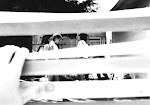The other day, coming out of church, my 12-year-old son asked me "Why did Hitler hate Jews?" I said "What a question to ask me, coming out of church..." Don't get me wrong -- I love having long talks with my son on a variety of subjects and I love that he's interested in history. But at that moment I was not sure how I could ever answer that question. Where to begin -- with World War I leading to World War II? Hitler's twisted personal history? The legacy of anti-semitism in Western civilization? Sigh. He's
twelve years old. My son's question came because his Reading class is currently doing a book by Eleanor H. Ayers called
Parallel Journeys.
Parallel Journeys is based on two memoirs -- of a boy, Arthur, who joins Hitler Youth, and a Jewish girl, Helen, who is trapped in Holland. It seems like a good way to tell the history of the time period and I like the fact that it's non-fiction. The Holocaust is a major subject for children's/YA fiction today, of course. When I was growing up there were far fewer such books, but I was fascinated by the subject, and read every one I got my hands on. (I remember those books reinforcing my already strong feeling that most ordinary people are cowards.) One I remember very well was
The Devil in Vienna by Doris Orgel, along with
When Hitler Stole Pink Rabbit by Judith Kerr and -- a real classic of the era --
The Hiding Place by Corrie Ten Boom. (I'm not leaving out Anne Frank, but I read that when I was much older.)
It's worth noting that all of the above books, even those labeled fiction, had non-fiction roots. Doris Orgel and Judith Kerr based their books on their own childhood experiences as refugees. There are many classic novels of the Holocaust -- Jane Yolen's
The Devil's Arithmetic foremost -- but I think that memoirs, or fictionalized memoirs, of the subject have something that novels just lack. And I supposed that something has something to do with the question my son asked me. Why did it all happen? How could it have happened?
And how, as writers, do we ever grapple with such a subject?
Everyone who has ever tried has begun, basically, with story of one person. A boy who wants to join the Hitler Youth. A Jewish girl with a Christian best friend in Vienna. A girl who starts her diary by writing about her birthday presents and her movie star picture collection.
Perhaps that's the only way, as humans, we can ever understand things.
 I always get days off this time of year so I spent this afternoon doing Easter eggs with my son, who is officially too old for Easter eggs. I have no real point here, just the joy of doing something simple and colorful. Happy Easter!
I always get days off this time of year so I spent this afternoon doing Easter eggs with my son, who is officially too old for Easter eggs. I have no real point here, just the joy of doing something simple and colorful. Happy Easter!






 The other day I was arguing with someone at work about going to a potluck lunch. I wanted to go. The other person -- from some personal motive I was unable to dig out -- didn't. Later, when I was wondering why I had to be so self-righteous about it, I thought, well, you're Pig Will and she's Pig Won't.
The other day I was arguing with someone at work about going to a potluck lunch. I wanted to go. The other person -- from some personal motive I was unable to dig out -- didn't. Later, when I was wondering why I had to be so self-righteous about it, I thought, well, you're Pig Will and she's Pig Won't. 